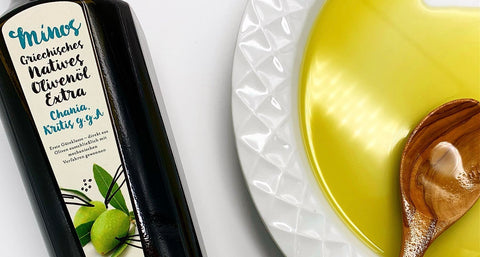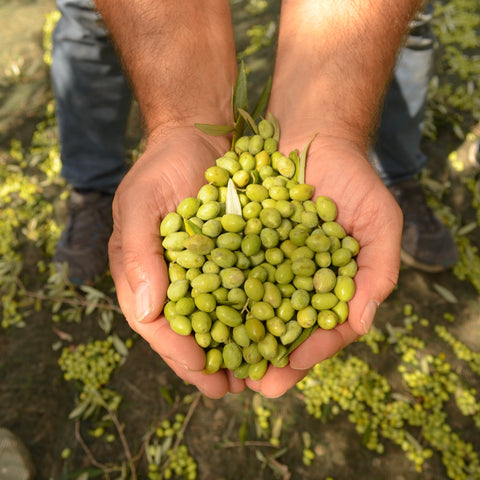There is a lot of talk about polyphenols and their important role in our health. While they are found in many plants, there are some particularly powerful polyphenols in extra virgin olive oil, which explains why it has been considered a superfood since ancient times. Whether it is through a wider post-Covid health movement, innovations and research in nutrition, or our eternal search for the fountain of youth, polyphenols are on everyone's lips.
Since this is a topic that is particularly dear to us in the olive oil industry, we would like to explain it from the perspective of those who produce it every day and serve it at every meal.
What are polyphenols?
In short, they are antioxidants. The term "polyphenol" is a collective term for a family of organic compounds that occur naturally in plants. Also known as biophenols, they are highly valued for their antioxidant properties as they fight free radicals.
Their role in fighting cancer, heart disease and dementia has led to increased research in recent years. While there are over 8,000 types of polyphenols in various plants we eat and drink, there are about 25 specific polyphenols in extra virgin olive oil, including oleocanthal, oleuropein and hydroxytyrosol.
Which oils contain the most polyphenols?
Not all oils are created equal. Extra virgin olive oil is essentially freshly pressed fruit juice. When best produced, fresh olives are pressed within hours of being harvested, and the liquids are separated to give us this unique, edible oil.
Extra virgin olive oil contains the most polyphenols, as this quality represents superior quality. Within the extra virgin olive oil category, there are various indicators of higher polyphenol content:
- Fresh oils: The closer to the harvest date, the better.
- When to harvest: The earlier in the season, the better.
- Processing: The time it takes to get to the mill and the skills and technology at the mill are crucial.
- Varieties: Some olives and hyperregional climatic factors influence the polyphenol content.
Note: If the label does not say "extra virgin" or "virgin," the oil is refined. When olive oil is refined, all of these valuable polyphenols are removed through the intensive processing process. Sometimes some are returned, but the amounts are not comparable to those in extra virgin olive oil.
What is “high polyphenol” olive oil?
Any brand that makes health claims should back them up with evidence. Don't accept any brand that makes health claims without an independent analysis or certification that their oil actually contains more antioxidants than others.
According to EU Regulation 432/2012, olive oils containing 250 mg/kg of polyphenols or more are considered ‘highly polyphenolic’. To make health claims on packaging, additional testing is required: ‘The claim may only be used for olive oil containing at least 5 mg of hydroxytyrosol and its derivatives (eg oleuropein complex and tyrosol) per 20 g of olive oil. To make the claim, consumers must be informed that the beneficial effect is achieved with a daily intake of 20 g of olive oil.’ — Official Journal of the European Union
At Minos, we ensure that our oils are always above the 250 mg/kg benchmark. Many of our oils have significantly higher levels and we specifically curate some batches that are double or triple that to ensure they are still truly high polyphenols even a year after bottling.
How do you know if an extra virgin olive oil is rich in polyphenols?
The great thing about polyphenols is that you can taste them in EVOO. They actually make eating (and drinking) much more enjoyable!
Certain polyphenols produce different organoleptic experiences. The bitter sensation on the palate or the peppery scratchiness at the back of the throat are direct consequences of polyphenols. This not only provides an incredible taste experience, but is also the hallmark of polyphenols in olive oil.
To test this, pour some olive oil into a small cup. Swirl it, warm it with your hand and take a deep breath. Then take a small sip, hold it in your mouth for a moment and then swallow it. The bitter and peppery sensation indicates the polyphenol content.
How much extra virgin olive oil should I consume to reap the benefits?
Research shows that as little as 1-2 tablespoons a day can be beneficial. However, much higher amounts are consumed in the Mediterranean region. A study in Spain with over 7,000 participants found that "those who consumed at least 4 tablespoons (60 ml) of olive oil daily were 30% less likely to develop heart disease."
To use it as it is done in the Mediterranean, enjoy it at all meals: on your morning toast, over yogurt, in salads and soups at lunch, and finally over grains and roasted vegetables at dinner.
How many polyphenols should I consume from olive oil? Is there a maximum?
The EU has set the qualification for ‘high polyphenol’ olive oils at 250 mg/kg. Some in the Community believe that this value should be higher in order to maintain the level over the life of the oil (1-2 years).
Dr Simon Poole explains: "There is compelling data to support the beneficial effects of high polyphenolic extra virgin olive oil as a protective antioxidant and anti-inflammatory food. There is extensive data to show that consuming 30-50ml of extra virgin olive oil daily provides health benefits."
Some manufacturers offer extra virgin olive oils with polyphenol contents above 1,000 mg/kg in small bottles as nutraceuticals and recommend a daily “dose” of 5 ml. Whether such oils have similar or improved effects is unclear and requires further research.
Do polyphenols have other positive effects in olive oil besides their health benefits?
Absolutely. Polyphenols give the oil a richer aroma and a more intense flavor. They extend the shelf life because antioxidants protect the oil from oxidation and keep it fresh longer. High-polyphenol olive oils are also better for cooking.
While extra virgin olive oil is mainly




Comments (1)
Polyphenols in Minos evoo? Thank you. It’s an important factor for health benefits. I hear great things about the taste. But no days the polyphenols factor in when making these choices.